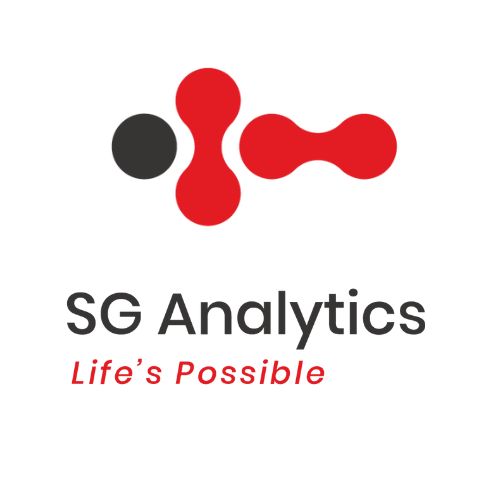- Resources
- Blog
- The Intersection of AI, Blockchain, and BFSI: A Look into the Future
The Intersection of AI, Blockchain, and BFSI: A Look into the Future
AI
Contents
July, 2025
The world of finance is changing quite profoundly. Once-futuristic technologies are now influencing how banking, financial services, and insurance (BFSI) organizations worldwide operate. Among these catalysts for major disruptions, blockchain and artificial intelligence (AI) take the top spot. After all, together, they have the potential to reimagine everything, from customer service and fraud detection to compliance, for better outcomes. This post will demonstrate the key aspects of the intersection of AI, blockchain technology, and BFSI.
AI-Blockchain Synergies: Altering the DNA of Global Financial Institutions
AI and blockchain have gone beyond being experimental technologies with rare applications relevant to banking or investing stakeholders. As of now, they have migrated to powering mainstream BFSI activities with significantly better, more practical use cases. Agentic AI can facilitate dedicated customer service robots. Meanwhile, customized AI tools excel as credit score engines or trading algorithms.
Blockchain, in turn, improves data protection. It prioritizes ensuring transaction integrity by enforcing smart contracts with automated, strictly context-triggered functions. However, as a combination, AI and blockchain technologies provide platforms for trust, efficiency, and innovation that were mostly unheard of a few years ago.
J.P. Morgan Chase, for instance, has used AI to automate and accelerate how its team reviews legal contracts. Their COiN (Contract Intelligence) platform makes that possible. Furthermore, it is also using blockchain in its JPM Coin venture to facilitate immediate settlement of payments involving institutional customers. Most reports indicate these are not standalone efforts. Instead, such initiatives are often representative of a phase in a broader, strategic reinvention agenda.
Read more: Healthcare PE in 1Q25: Defensive Postures, Selective Plays
AI and Blockchain: A Complementary Force
AI and blockchain might seem unrelated or diametrically opposite. Remember, AI depends on data aggregation and pattern discovery. As a result, its training datasets must continuously evolve to mimic the human capacity for lifelong learning. On the other hand, BFSI firms adopt blockchain. This technology has a sharp focus on data immutability and decentralization.
Regardless, beyond the initial misconceptions about their opposite philosophies, every BFSI company can use their powers at the same time. They are excellent tools that complement each other. After all, reliable AI agents require good quality, unbiased data. Thankfully, a blockchain can swiftly confirm the integrity and trackability of the data across training datasets, consumer profiling assets, and market intelligence.
In financial services, this pairing will surely solve the most recurring problem in the BFSI space, which is none other than trust-driven relationship management. For example, AI will explore vast amounts of customer transaction data to identify anomalies that help anticipate fraud. Once recorded on a blockchain, the audit trail becomes tamper-proof. Therefore, it increases regulatory compliance and effectively minimizes any need for manual, human-aided verification.
Think of Standard Chartered. It has been venturing into blockchain-based trade finance solutions. Its initiatives also encompass applying AI for advanced anti-money laundering (AML) detection. Its ability relies on combining AI-powered analytics with blockchain’s traceability features. In a way, Standard Chartered PLC’s solutioning makes it a forward-thinking company in the BFSI sector.

The Intersection of AI, Blockchain, and BFSI: A Look into the Future
1. Deploying Smart Contracts and Intelligent Automation
Smart contracts are blockchain’s answer to stakeholders’ requests for scalable, secure automation. They run predefined rules with respective triggers. Performing a preconfigured type of transaction automatically launches the rule enforcement. Unfortunately, conventional smart contracts are not suitable for everyone since they are likely to come off as stiff and inflexible.
This is where AI comes in. Agentic AI tools can enhance blockchain smart contracts by injecting contextual decision-making elements. They will also make those contracts more accessible, explainable, and universally easier to use.
Envision an insurance policy. Will it not be better if it dynamically modifies premiums by leveraging real-time risk analysis to note the changes in the insured parties’ vulnerability indicators? AI can seamlessly analyze the risk considerations from the policyholder users’ data. Later, a blockchain can automatically start enforcing the contract based on premium repayments and new risk intelligence.
Read more: The Transformative Benefits of Agentic AI in Insurance
Between September 2017 and November 2019, AXA Insurance, a French firm, experimented with a form of the mechanism discussed above using its Fizzy platform. It essentially utilized smart contracts to automate payouts on travel insurance. If the flight was delayed, the insured parties could get their claims settled with minimal paperwork.
That Fizzy platform relied on the Ethereum blockchain and was ultimately shut down because of the lack of market appetite. Still, it laid the groundwork necessary for more advanced applications. In the future, the combination of AI-powered analytical insights and self-executing contracts will likely be the norm to automate much of the insurance workflow. It will give remarkable relief to claimants during the paperwork, forcing BFSI players to innovate underwriting and claims settling.
2. Reimagining BFSI Customer Experience (CX) with AI and Blockchain
The visible impact of AI on BFSI industry players has much to do with personalizing customer experience. For instance, agentic AI paves ways for leveraging chatbots, voice assistants, or financial robo-advisors. They have already become part of the digital-first services across many banks and non-banking financial companies (NBFCs). These applications employ natural language processing (NLP) and machine learning to process customer queries. They also provide relevant information in response 24/7.
Bank of America (BofA) ’s Erica is a noteworthy example. It helps the bank’s customers with their banking requirements and offers information on spending trends. Besides, it goes the extra mile and guides the depositors on how to save money. Similar agentic AI solutions can also educate borrowers about healthy credit management behaviors. Today, Erica is based on AI. However, its newer might use blockchain to verify transactions or give secure financial advice only after zero-tolerance data validity checks.
This intersection of AI and blockchain technologies can potentially make BFSI customer interactions quicker, more secure, and properly personalized. For the record, Erica had over 2 billion interactions on 8 April 2024, according to a newsroom entry on BofA’s official site. As blockchain successfully decentralized identity verification, AI can customize banking services with increased accuracy, decreasing friction in daily depositing or borrowing activities.
3. Combating Fraud Detection with Risk Management AI Modeling and Blockchain
Fraudulent transactions and misleading document submissions are those high-risk issues that no BFSI stakeholder can afford to neglect and underestimate. Misuse of many modern technologies is also on the rise, adding to the fraudsters and money launderers’ capabilities. That is why all banks, insurance providers, fund managers, and investors must embrace AI and blockchain technologies.
Outdated rule-based, rigid systems follow reactive philosophies with a narrow scope. AI has changed this situation for the better, allowing real-time, predictive models. These models consistently learn from past records on fraudulent transactions and evolve to counter new threats.
Blockchain further boosts the effectiveness of AI-powered fraud prevention. It does this by offering an unalterable ledger. Such integration makes it significantly more arduous to override transaction records and hide the activities for supervisory tools or financial professionals. Every action is traceable and verifiable. This two-pronged strategy flawlessly results in more effective fraud prevention systems benefitting from proactive strategies.
Mastercard is well-recognized among the leading global payment processing companies that want this convergence to become the standard. It has already submitted multiple patents for AI and blockchain. Mastercard’s top priority is none other than targeting secure payment systems and transaction validation in its in-house research initiatives. Its team vision frequently points toward a world where transaction validation and fraud detection occur in real-time. Such corporations strive to create mostly un-hackable credit and debit records.
Read more: The Future of BFSI: How Agentic AI is Reshaping the Industry
4. Ensuring Regulatory Compliance and Reporting Using the AI-Blockchain Hybrid Approach
Compliance with regulatory requirements is an operational challenge for BFSI firms. Remember, regulations like GDPR, PSD2, and Basel III require high levels of transparency, data protection, and accuracy in reporting. AI can assist the firms by automating compliance checks. An agentic AI will also extract key data points and raise alarms for anomalies in real-time.
Blockchain adds another layer. It ensures the data reported is not being tampered with. Simultaneously, regulators would, in theory, access real-time information directly from a blockchain. So, there will be less of a need to rely on periodic, on-paper reports. This progress could save enormous amounts of compliance costs and errors.
HSBC has been testing blockchain in trade finance. It also employs AI for compliance tracking. Such efforts indicate a trend where BFSI companies are developing integrated platforms that combine both technologies. Doing so increases their effectiveness in addressing regulatory requirements that keep changing as new leadership transitions occur.
Formalization of AI and Blockchain: The Role of Central Bank Digital Currencies (CBDCs)
The introduction and growing popularity of central bank digital currencies is another field where blockchain and AI overlap, defining the future of the BFSI industry. Many governments are testing blockchain-based digital currencies. Moreover, AI is assisting them in modeling or simulating different policy effects. Agentic AI models can also forecast the economic effect of CBDC adoption and optimize distribution plans. Therefore, implementation hurdles can be noted early on, and proactive strategies can be adopted to reduce the expected severity.
China’s digital currency is digital yuan (e¥). It is backed by the People’s Bank of China. It employs blockchain-inspired design. Unfortunately, it is not decentralized. Nevertheless, the system includes AI to track transactions. That is why fighting illicit activities becomes more manageable.
Meanwhile, India’ CBDC is the digital rupee or eRupee (e₹), backed by the Reserve Bank of India, and its wholesale version, e₹-W, supports smart contracts. Those smart contracts are enforceable for government securities settlements and interbank lending-borrowing in call money market. Such innovations illustrate how the public and private sectors are enthusiastically converging toward tech-based monetary systems.
With the increasing adoption of such CBDCs, BFSI organizations must alter their infrastructure. These currencies demonstrate how AI will undeniably modernize managing transactional flows, and blockchain tech will facilitate the secure rails for value transmission.
Read more: The Future of Data Governance: Data Governance Trends 2025
Challenges and Ethical Considerations
While the integration of AI and blockchain has several advantages, there are also some drawbacks that BFSI firms cannot overlook. Data privacy is one major issue. After all, extensive datasets are needed to train AI systems. However, the storage of sensitive data on an immutable blockchain could create humongous compliance challenges if executive flaws cause data breaches or unauthorized capital transfers.
There are also issues pertaining to transparency and whether algorithmic bias affects AI output. How do we maintain fairness and accountability if smart contracts are based on biased AI decisions? These are challenging questions that need adequate regulations. At the same time, regulatory oversight must be avoided as it often decelerates responsible innovation.
At the end of the day, global BFSI stakeholders must balance compliance and innovation. Partnerships among tech providers, regulators, and financial institutions will be crucial in this endeavor. The result should be standardization for ethical norms that will build trust.
Conclusion: Looking Ahead to More Secure and Context-Aware Workflow Improvements
The BFSI industry’s future will be shaped by the intersection of AI and blockchain. This is not merely about implementing new tools. Rather, stakeholders must fundamentally reinvent the way financial services have been functioning for decades. From customizing banking facilities to automating insurance claim evaluation and settlement, BFSI firms can now eye better CX metrics. They also expect more secure payments governed by smart regulatory systems because it is an era-defining opportunity for a competitiveness boost.
Firms that adopt this overlap between AI and blockchain earlier than competitors will gain a huge edge. Those behind will have to catch up with today’s digitalized and decentralized financial landscape. While machines get smarter and blockchain networks expand, the duo’s effect on BFSI will open up new discussions about data ethics, explainable AI, and accounting integrity. The coming decade will probably see new financial systems emerge, powered by the trust and cleverness these innovations bring.
About SG Analytics
SG Analytics (SGA) is an industry-leading global data solutions firm providing data-centric research and contextual analytics services to its clients, including Fortune 500 companies, across BFSI, Technology, Media & Entertainment, and Healthcare sectors. Established in 2007, SG Analytics is a Great Place to Work® (GPTW) certified company with a team of over 1200 employees and a presence across the U.S.A., the UK, Switzerland, Poland, and India.
Apart from being recognized by reputed firms such as Gartner, Everest Group, and ISG, SGA has been featured in the elite Deloitte Technology Fast 50 India 2023 and APAC 2024 High Growth Companies by the Financial Times & Statista.
Related Tags
AI BFSI Blockchain Future of AI TechAuthor

SGA Knowledge Team
Contents